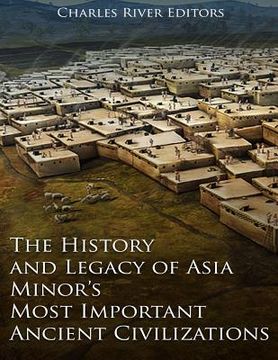The History and Legacy of Asia Minor's Most Important Ancient Civilizations (en Inglés)
Reseña del libro "The History and Legacy of Asia Minor's Most Important Ancient Civilizations (en Inglés)"
*Includes pictures *Includes ancient accounts *Includes online resources and a bibliography for further reading The pages of world history textbooks contain a litany of "lost" empires and civilizations, but usually, upon further review, it is revealed that these so called lost empires are often just lesser known cultures that had a less apparent impact on history than other more well-known civilizations. When one scours the pages of history for a civilization that was inexplicably lost, but had a great impact during its time, very few candidates can be found, but the Hittites are a notable example. In fact, the Hittites are an ancient people who remain somewhat enigmatic, and perhaps little known to most people, but their influence on the ancient Near East is undeniable. From high on their capital of Hattusa in central Anatolia, the Hittites were able to conquer and control a kingdom that roughly comprised the area of the modern nation-states of Turkey, Syria, and parts of Iraq and Lebanon through a combination of brute military force and shrewd diplomatic machinations. Among the peoples of the ancient Near East, few are more misunderstood than the Scythians. The Scythians swept into Anatolia in the early first millennium BCE and left a large swath of destruction in their wake. They challenged old, strong, and venerable kingdoms such as the Assyrians, Egyptians, and Medes, until they were defeated by the Medes and then gradually disappeared into historical obscurity once more. According to the ancient Greek historian Herodotus, the Scythians ruled a large part of the Near East for nearly 30 years, but before they disappeared from the historical record, the Scythians greatly impacted the history of the Near East. Of all the empires and kingdoms in the ancient world, few could compare with the Lydians in terms of wealth and opulence. From the early 7th century BCE until the middle of the 6th century BCE, the Lydians played an important role in the history of the eastern Mediterranean region as they took on the role of middleman between the empires of the Near East and the emerging Hellenic civilization in Greece. From their capital in Sardis, the Lydian kings traded and made alliances and war with numerous kings, tyrants, and generals, which ultimately cemented their role as a brief but historically important people and kingdom in the ancient world. The Phrygians built a powerful and wealthy kingdom, but they were overshadowed by their more powerful and wealthier neighbors, the Lydians. Although the Phrygians were literate, most of their surviving texts have been little use to modern historians who desire to reconstruct their chronology, so they are left to use often biased Classical and Assyrian sources. Problems concerning nomenclature have also clouded the modern understanding of Phrygia and the Phrygians; the Greeks would often refer to numerous non-Phrygian peoples as Phrygians, and while the Persians acknowledged the Phrygians as a distinct people, they only considered them so as part of a satrapy or province in the vast Achaemenid Persian Empire. The History and Legacy of Asia Minor's Most Important Ancient Civilizations looks at the groups that dominated the region in antiquity and the influence they left upon Asia Minor and their contemporaries. Along with pictures of important people, places, and events, you will learn about the history of Asia Minor's most important civilizations like never before.

